标签:实现 onclick 测试 bsp pow hide https UNC data
交叉冲印滤镜又叫做正片负冲滤镜,关于它的原理我一直没找到,希望有大佬给我甩个链接。
我用的测试图像在这里
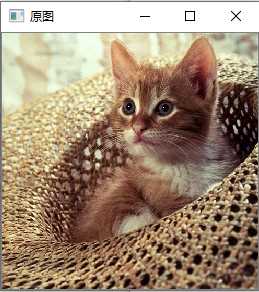


我实现的交叉冲印是使用上图这样的点运算来实现的,下面是我的代码

void punchFilter(Mat src) { int width = src.rows; int height = src.cols; int gray, value; int rMap[256], gMap[256], bMap[256]; for (int i = 0; i < 256; i++){ value = i < 128 ? i : 256 - i; gray = (int)pow(value, 3) / 16384; // value的3次方再除以16384 rMap[i] = i < 128 ? gray : 256 - gray; gray = (int)pow(value, 2) / 128; // value的2次方再除以128 gMap[i] = i < 128 ? gray : 256 - gray; bMap[i] = i / 2 + 0x25;//0x25 = 37 } for (int j = 0; j < width - 1; j++) { uchar* data = src.ptr<uchar>(j); for (int i = 0; i < height - 1; i++) { int b = bMap[data[i * 3]]; int g = gMap[data[i * 3 + 1]]; int r = rMap[data[i * 3 + 2]]; data[i * 3] = min(255, max(0, b)); data[i * 3 + 1] = min(255, max(0, g)); data[i * 3 + 2] = min(255, max(0, r)); } } imshow("交叉冲印滤镜", src); }
效果图是这样的
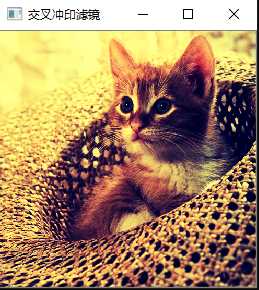
这是怀旧风格滤镜,对原像素点的R、G、B进行变换

void recall(Mat src) { int width = src.rows; int height = src.cols; Mat img(src.size(), CV_8UC3); int x, y; for (y = 0; y < height;y++) { uchar* P0 = src.ptr<uchar>(y); uchar* P1 = img.ptr<uchar>(y); for (x = 0; x < width; x++) { float R = P0[3 * x + 2]; float G = P0[3 * x + 1]; float B = P0[3 * x]; float newR = 0.393 * R + 0.769 * G + 0.189 * B; float newG = 0.349 * R + 0.686 * G + 0.168 * B; float newB = 0.272 * R + 0.534 * G + 0.131 * B; if (newR < 0) newR = 0; if (newR > 255) newR = 255; if (newG < 0) newG = 0; if (newG > 255) newG = 255; if (newB < 0) newB = 0; if (newB > 255) newB = 255; P1[3 * x] = (uchar)newB; P1[3 * x + 1] = (uchar)newG; P1[3 * x + 2] = (uchar)newR; } } imshow("怀旧滤镜实现", img); }
效果图:
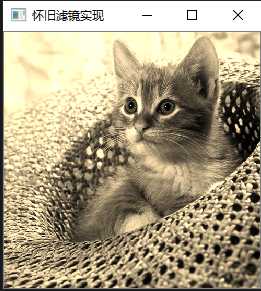
好像有点问题啊,图片不发黄啊

实现代码:
void light(int X, int Y, int K, int R, Mat src) { int width = src.rows; int height = src.cols; double distance; int x, y; Mat img; vector<Mat> m(3); split(src, m); for (y = 0; y < width ; y++) { for (x = 0; x < height; x++) { distance = sqrt((X - x) * (X - x) + (Y - y) * (Y - y)); if (distance < R) { int temp = K * (0 > 1 - distance / R ? 0 : 1 - distance / R); if (temp > 255) temp = 255; int a = m[0].at<uchar>(x, y) + temp; m[0].at<uchar>(x, y) = MIN(255, MAX(0, a)); a = m[1].at<uchar>(x, y) + temp; m[1].at<uchar>(x, y) = MIN(255, MAX(0, a)); a = m[2].at<uchar>(x, y) + temp; m[2].at<uchar>(x, y) = MIN(255, MAX(0, a)); } } } merge(m, img); imshow("光照滤镜实现", img); }
效果图:
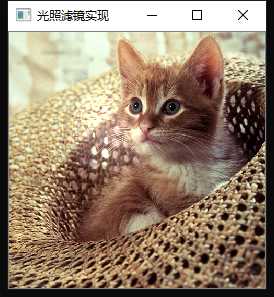
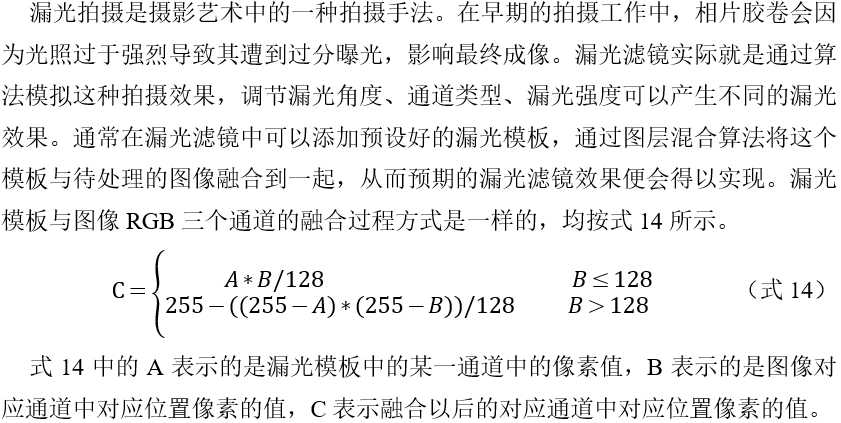
代码如下:
void leak(Mat src1, Mat src) { int width = src1.cols, height = src1.rows; float newB; float newG; float newR; Mat img(src1.size(), CV_8UC3); for (int y = 0; y < height; y++) { uchar* P0 = src.ptr<uchar>(y); uchar* P1 = src1.ptr<uchar>(y); uchar* P3 = img.ptr<uchar>(y); for (int x = 0; x < width; x++) { if (P1[3 * x] <= 128) { newB = P0[3 * x] * P1[3 * x] / 128; } else newB = 255 - ((255 - P0[3 * x]) * (255 - P1[3 * x])) / 128; if (newB > 255) { newB = 255; } if (P1[3 * x + 1] <= 128) { newG = P0[3 * x + 1] * P1[3 * x + 1] / 128; } else newG = 255 - ((255 - P0[3 * x + 1]) * (255 - P1[3 * x + 1])) / 128; if (newG > 255) { newG = 255; } if (P1[3 * x + 2] <= 128) { newR = P0[3 * x + 2] * P1[3 * x + 2] / 128; } else newR = 255 - ((255 - P0[3 * x + 2]) * (255 - P1[3 * x + 2])) / 128; if (newR > 255) { newR = 255; } P3[3 * x] = newB; P3[3 * x + 1] = newG; P3[3 * x + 2] = newR; }imshow("漏光滤镜", img); } }
漏光模板,用PS随便拉个前景色就好了
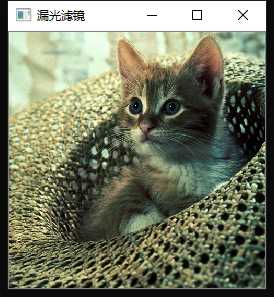

其实自己写的部分也没有多少,大部分还是在网上拼拼凑凑,终于得到了我想要的结果而已.
经过课设发现自己对于数字图像这块还是学习还是不够的,趁着寒假努力点吧.
最后附上整个项目的代码:
#include <opencv2/opencv.hpp> #include "opencv2/highgui/highgui.hpp" #include "opencv2/imgproc/imgproc.hpp" #include <stdio.h> #include <iostream> using namespace cv; using namespace std; //交叉冲印 void punchFilter(Mat src); //怀旧风格滤镜 void recall(Mat src); //光照效果滤镜 void light(int X, int Y, int K, int R, Mat src);//XY是光源坐标,K光照系数,R光照半径 //漏光滤镜 void leak(Mat src, Mat msak); int main(int argc, char** argv) { while (1) { cout << "请选择显示的滤镜效果" << endl; cout << "1、交叉冲印滤镜" << endl; cout << "2、怀旧风格滤镜" << endl; cout << "3、光照效果滤镜" << endl; cout << "4、漏光滤镜" << endl; int choice; cin >> choice; switch (choice) { case 1: { Mat src = imread(argv[1]); Mat p_temp(src.rows, src.cols, CV_8UC3, src.data); imshow("原图", src); punchFilter(p_temp); break; } case 2: { Mat src = imread(argv[1]); Mat r_temp(src.rows, src.cols, CV_8UC3, src.data); imshow("原图", src); recall(r_temp); break; } case 3: { Mat src = imread(argv[1]); Mat l_temp(src.rows, src.cols, CV_8UC3, src.data); int X, Y, K, R; cout << "请输入光源坐标(x,y),光照系数,光照半径" << endl; cin >> X >> Y >> K >> R; imshow("原图", src); light(X, Y, K, R, l_temp); break; } case 4: { Mat src = imread(argv[1]); Mat leak_temp(src.rows, src.cols, CV_8UC3, src.data); Mat mask = imread("C:\\Users\\18704\\Desktop\\mask.png"); imshow("原图", src); leak(leak_temp, mask); } default:{ cout << "无效字符,请重新输入" << endl; break; } } waitKey(0); } return 0; } void punchFilter(Mat src) { int width = src.rows; int height = src.cols; int gray, value; int rMap[256], gMap[256], bMap[256]; for (int i = 0; i < 256; i++){ value = i < 128 ? i : 256 - i; gray = (int)pow(value, 3) / 16384; // value的3次方再除以16384 rMap[i] = i < 128 ? gray : 256 - gray; gray = (int)pow(value, 2) / 128; // value的2次方再除以128 gMap[i] = i < 128 ? gray : 256 - gray; bMap[i] = i / 2 + 0x25;//0x25 = 37 } for (int j = 0; j < width - 1; j++) { uchar* data = src.ptr<uchar>(j); for (int i = 0; i < height - 1; i++) { int b = bMap[data[i * 3]]; int g = gMap[data[i * 3 + 1]]; int r = rMap[data[i * 3 + 2]]; data[i * 3] = min(255, max(0, b)); data[i * 3 + 1] = min(255, max(0, g)); data[i * 3 + 2] = min(255, max(0, r)); } } imshow("交叉冲印滤镜", src); } void recall(Mat src) { int width = src.rows; int height = src.cols; Mat img(src.size(), CV_8UC3); int x, y; for (y = 0; y < height;y++) { uchar* P0 = src.ptr<uchar>(y); uchar* P1 = img.ptr<uchar>(y); for (x = 0; x < width; x++) { float R = P0[3 * x + 2]; float G = P0[3 * x + 1]; float B = P0[3 * x]; float newR = 0.393 * R + 0.769 * G + 0.189 * B; float newG = 0.349 * R + 0.686 * G + 0.168 * B; float newB = 0.272 * R + 0.534 * G + 0.131 * B; if (newR < 0) newR = 0; if (newR > 255) newR = 255; if (newG < 0) newG = 0; if (newG > 255) newG = 255; if (newB < 0) newB = 0; if (newB > 255) newB = 255; P1[3 * x] = (uchar)newB; P1[3 * x + 1] = (uchar)newG; P1[3 * x + 2] = (uchar)newR; } } imshow("怀旧滤镜实现", img); } void light(int X, int Y, int K, int R, Mat src) { int width = src.rows; int height = src.cols; double distance; int x, y; Mat img; vector<Mat> m(3); split(src, m); for (y = 0; y < width ; y++) { for (x = 0; x < height; x++) { distance = sqrt((X - x) * (X - x) + (Y - y) * (Y - y)); if (distance < R) { int temp = K * (0 > 1 - distance / R ? 0 : 1 - distance / R); if (temp > 255) temp = 255; int a = m[0].at<uchar>(x, y) + temp; m[0].at<uchar>(x, y) = MIN(255, MAX(0, a)); a = m[1].at<uchar>(x, y) + temp; m[1].at<uchar>(x, y) = MIN(255, MAX(0, a)); a = m[2].at<uchar>(x, y) + temp; m[2].at<uchar>(x, y) = MIN(255, MAX(0, a)); } } } merge(m, img); imshow("光照滤镜实现", img); } void leak(Mat src1, Mat src) { int width = src1.cols, height = src1.rows; float newB; float newG; float newR; Mat img(src1.size(), CV_8UC3); for (int y = 0; y < height; y++) { uchar* P0 = src.ptr<uchar>(y); uchar* P1 = src1.ptr<uchar>(y); uchar* P3 = img.ptr<uchar>(y); for (int x = 0; x < width; x++) { if (P1[3 * x] <= 128) { newB = P0[3 * x] * P1[3 * x] / 128; } else newB = 255 - ((255 - P0[3 * x]) * (255 - P1[3 * x])) / 128; if (newB > 255) { newB = 255; } if (P1[3 * x + 1] <= 128) { newG = P0[3 * x + 1] * P1[3 * x + 1] / 128; } else newG = 255 - ((255 - P0[3 * x + 1]) * (255 - P1[3 * x + 1])) / 128; if (newG > 255) { newG = 255; } if (P1[3 * x + 2] <= 128) { newR = P0[3 * x + 2] * P1[3 * x + 2] / 128; } else newR = 255 - ((255 - P0[3 * x + 2]) * (255 - P1[3 * x + 2])) / 128; if (newR > 255) { newR = 255; } P3[3 * x] = newB; P3[3 * x + 1] = newG; P3[3 * x + 2] = newR; }imshow("漏光滤镜", img); } }
opencv 交叉冲印,怀旧风格,光照效果,漏光滤镜的c++实现
标签:实现 onclick 测试 bsp pow hide https UNC data
原文地址:https://www.cnblogs.com/lumping-boy/p/12164045.html